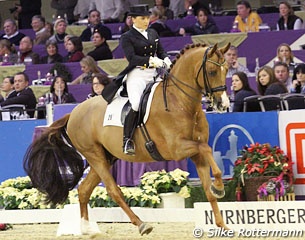
German team young rider Charlott Maria Schurmann and her Hanoverian bred Burlington, which she calls "the best horse in the world", have won the 2012 Nurnberger Burgpokal Finals in Frankfurt, Germany, and upset the establishment as this young rider outclasses seasoned professionals and claimed highest honour.
The Nurnberger Burgpokal show circuit is the most effective springboard German dressage has ever had: For 20 years now the circuit, named after its sponsor, has produced Olympic and world champions. The qualifications throughout the year and the final traditionally staged in Frankfurt in December have become a part of the German dressage system which is now ideally complemented with the young Grand Prix horses series finals (Louisdor Cup).Whereas the invitational Grand Prix-tour had a rather modest starter field and did not have the thrill of former years, this year’s Burgpokal final became one of the best in its history.
Already in the warm-up class on early Thursday morning it became apparent that the quality and maturity of most of the horses were outstanding and an exciting final was expected on Saturday 15 December 2012. In the Final the 7 to 9-year-old horses had to deal with a completely different atmosphere compared to the almost empty stands during the warm-up class. Saturday at 11 pm the Frankfurter Festhalle was packed with crowds awaiting one of the show’s annual highlights, creating a fairly noisy background.
Judged by Dr. Dietrich Plewa, Dr. Evi Eisenhardt, Dr. Dieter Schüle, Peter Holler and Katrina Wüst, the class was commented on after each ride by I-judge Christoph Hess, who summarised the strong and weak spots of each horse. Several of the horses in the field of 14 had already been winners or medalists at the Bundeschampionate or at the World Young Horse championships.
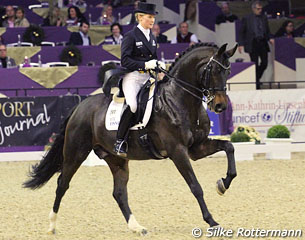 While Kathleen Keller, who was one of two riders competing two horses, opened the final with the chestnut Lord, Victoria Michalke’s 7-year-old Oldenburger gelding Wasabi OLD (by Welt Hit IV x Lancer I) was the first horse who was expected to be a serious contender for a high placing. The big framed gelding with a long topline was the winner of the last qualification just a few weeks ago at the CDN Nürnberg. He denied his young age and relative inexperience showing a really polished test to finish a remarkable 6th with over 74%. Being presented in a steady light contact, Wasabi executed regular extended trots which could have been a bit more energetic. The extended walk was relaxed with good stretching. The walk pirouettes, which turned out to be very tricky for several horses, were judged quite differently and marked between 6 and 8. Wasabi’s canter tour was very solid with no mark lower than 7 and the leggy Oldenburger impressed with already straight and balanced flying changes. "It is only his 2nd indoor show," Michalke told the spectators, "but he always wants to make it right and is eager learning new things which he does quickly."
While Kathleen Keller, who was one of two riders competing two horses, opened the final with the chestnut Lord, Victoria Michalke’s 7-year-old Oldenburger gelding Wasabi OLD (by Welt Hit IV x Lancer I) was the first horse who was expected to be a serious contender for a high placing. The big framed gelding with a long topline was the winner of the last qualification just a few weeks ago at the CDN Nürnberg. He denied his young age and relative inexperience showing a really polished test to finish a remarkable 6th with over 74%. Being presented in a steady light contact, Wasabi executed regular extended trots which could have been a bit more energetic. The extended walk was relaxed with good stretching. The walk pirouettes, which turned out to be very tricky for several horses, were judged quite differently and marked between 6 and 8. Wasabi’s canter tour was very solid with no mark lower than 7 and the leggy Oldenburger impressed with already straight and balanced flying changes. "It is only his 2nd indoor show," Michalke told the spectators, "but he always wants to make it right and is eager learning new things which he does quickly."
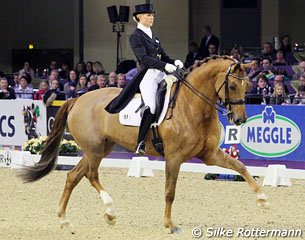 Finishing seventh in the warm-up class, the big framed mare First Class lived up to her name in the final. Presented by Juliane Brunkhorst and already sold to Caroline Wilm, the Hanoverian stunned with her elastic ground covering movements and her extraordinary dynamic created by her powerfully pushing hind-legs. The judges didn’t hesitate to reward the first extended trot with marks from 8 to 10. Whereas the trot tour was nothing else than impressive, the walk turned out to be mediocre with the horse failing to show any overtrack or stretching of the nose in front of the vertical. The canter pirouettes on both hands could have been more in rhythm, in particular the second one. In general many horses struggled to show rhythmic and settled canter pirouettes, yet taking into account that these are PSG – and no Grand Prix horses. Brunkhorst who is trained by her partner, renowned German professional Hartwig Burfeind, risked everything in the ground-covering uphill canter extension which earned them a 2nd 10 on that day. The mare also did very good flying changes in which she made good use of her long uphill stride. Although one wished a less strong contact with the mouth, Brunkhorst showed a high class performance on her mare which earned them a very well deserved 2nd place with 75.171%.
Finishing seventh in the warm-up class, the big framed mare First Class lived up to her name in the final. Presented by Juliane Brunkhorst and already sold to Caroline Wilm, the Hanoverian stunned with her elastic ground covering movements and her extraordinary dynamic created by her powerfully pushing hind-legs. The judges didn’t hesitate to reward the first extended trot with marks from 8 to 10. Whereas the trot tour was nothing else than impressive, the walk turned out to be mediocre with the horse failing to show any overtrack or stretching of the nose in front of the vertical. The canter pirouettes on both hands could have been more in rhythm, in particular the second one. In general many horses struggled to show rhythmic and settled canter pirouettes, yet taking into account that these are PSG – and no Grand Prix horses. Brunkhorst who is trained by her partner, renowned German professional Hartwig Burfeind, risked everything in the ground-covering uphill canter extension which earned them a 2nd 10 on that day. The mare also did very good flying changes in which she made good use of her long uphill stride. Although one wished a less strong contact with the mouth, Brunkhorst showed a high class performance on her mare which earned them a very well deserved 2nd place with 75.171%.
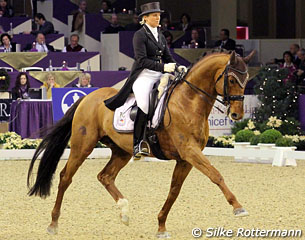 Uta Gräf with her 7-year-old Rhinelander stallion Damon Jerome NRW (by Damon Hill x Guy Laroche) had probably hoped for a better end result. The licensed Damon Hill-offspring was third two days earlier and as a Bundeschampionat- and World Championships medalist last year many expected him in the run for a top place as well at Frankfurt. Gräf and "DJ" were enthusiastically welcomed by the Frankfurt audience which the stallion took stoically. The pair wowed with a fluent and very ground covering first trot extension. The impulsion carried on in his trot half passes, though he needed to show more bend in the ribcage. The extended walk was free from the shoulder and with copybook stretch from the first step on. Both canter pirouettes were rhythmic, but the second not as centred as the first one. For both the judges were not in unison, marks differed from 6 to 8. A higher place than their 7th spot in the end was hindered by the flying changes which needed to be straighter and more balanced. Uta was forced to give visible aids. Also the last halt was almost non-existent as DJ reacted to the uproar in the stands. The light-footed stallion impressed with his wonderful self-carriage and fine bit contact throughout his test.
Uta Gräf with her 7-year-old Rhinelander stallion Damon Jerome NRW (by Damon Hill x Guy Laroche) had probably hoped for a better end result. The licensed Damon Hill-offspring was third two days earlier and as a Bundeschampionat- and World Championships medalist last year many expected him in the run for a top place as well at Frankfurt. Gräf and "DJ" were enthusiastically welcomed by the Frankfurt audience which the stallion took stoically. The pair wowed with a fluent and very ground covering first trot extension. The impulsion carried on in his trot half passes, though he needed to show more bend in the ribcage. The extended walk was free from the shoulder and with copybook stretch from the first step on. Both canter pirouettes were rhythmic, but the second not as centred as the first one. For both the judges were not in unison, marks differed from 6 to 8. A higher place than their 7th spot in the end was hindered by the flying changes which needed to be straighter and more balanced. Uta was forced to give visible aids. Also the last halt was almost non-existent as DJ reacted to the uproar in the stands. The light-footed stallion impressed with his wonderful self-carriage and fine bit contact throughout his test.
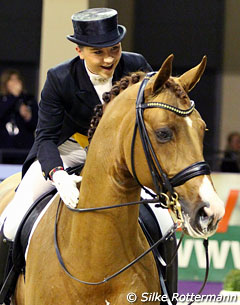 Smiling from ear to ear was the 19-year-young European Young Riders' team gold winner Maria-Charlott Schürmann on her most charming Breitling W-son Burlington. The 9-year-old Hanoverian is a true show-man who seems to grow inches instead of becoming distracted when he faced a big crowd like in Frankfurt. "I am so proud being allowed to ride here. Burly is a super-friendly horse, never cheeky, he is just the best horse in the world," Schürmann said about her horse. This long-time pair won the warm-up class and showed no real flaws in the final. Schürmann rode with lots of self-confidence which she seems to get from the knowledge that her horse will fight for her no matter what. Both started with a good first trot extension, in the second the horse should have been more in front of the vertical. The half passes were fluent with clear rhythm and with the horse up in the neck. In the walk this chestnut, who is clearly stamped by his massive sire, showed a relaxed walk with good overtrack, but he could have dropped his neck more. Both walk pirouettes were fairly small, the ones in canter balanced with a high foreleg, but the horse could have been even more diligent behind. Burlington went on to show an excellent canter extension with each stride flowing through the whole horse. Probably the highlights of the ride were the flying changes. The Hanoverian made them look like child’s play with every stride uphill, forwards and the same length. There was no doubt that this courageous and very harmonious ride on a very supple horse would be rewarded with high marks and the five judges were in unison that it had been the winning one. The score of 77.707% secured Maria-Charlott Schürmann and her stallion the victory in the 2012 Nürnberger Burgpokal final and the young lady, who is trained by Oliver Oelrich, is the youngest ever winner of this coveted title.
Smiling from ear to ear was the 19-year-young European Young Riders' team gold winner Maria-Charlott Schürmann on her most charming Breitling W-son Burlington. The 9-year-old Hanoverian is a true show-man who seems to grow inches instead of becoming distracted when he faced a big crowd like in Frankfurt. "I am so proud being allowed to ride here. Burly is a super-friendly horse, never cheeky, he is just the best horse in the world," Schürmann said about her horse. This long-time pair won the warm-up class and showed no real flaws in the final. Schürmann rode with lots of self-confidence which she seems to get from the knowledge that her horse will fight for her no matter what. Both started with a good first trot extension, in the second the horse should have been more in front of the vertical. The half passes were fluent with clear rhythm and with the horse up in the neck. In the walk this chestnut, who is clearly stamped by his massive sire, showed a relaxed walk with good overtrack, but he could have dropped his neck more. Both walk pirouettes were fairly small, the ones in canter balanced with a high foreleg, but the horse could have been even more diligent behind. Burlington went on to show an excellent canter extension with each stride flowing through the whole horse. Probably the highlights of the ride were the flying changes. The Hanoverian made them look like child’s play with every stride uphill, forwards and the same length. There was no doubt that this courageous and very harmonious ride on a very supple horse would be rewarded with high marks and the five judges were in unison that it had been the winning one. The score of 77.707% secured Maria-Charlott Schürmann and her stallion the victory in the 2012 Nürnberger Burgpokal final and the young lady, who is trained by Oliver Oelrich, is the youngest ever winner of this coveted title.
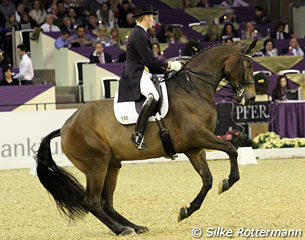 After Burlington’s ride there were still four more horses to come and the fight for the other top places was surely on with Ingrid Klimke, Kathleen Keller and Dorothee Schneider still to come. Maybe not yet that well known, but a pleasure to watch was the German rider Jan-Dirk Gießelmann whose family runs a breeding and training farm in Lower Saxony. The tall rider suited his big leggy Hanoverian Real Dancer very well and both gave the established riders a run for their money. At first look this gelding (by Rubin Royal x De Niro) appears a bit ordinary, but he wins as soon as he is moving. The horse oozes elasticity through his whole, big body and has a huge motor with diligent and extremely active hind-legs which enabled him to virtually float across the diagonal in both trot extensions. It earned him seven 9s and three 8s from the judging panel. Real Dancer spooked shortly at the entrance, but Gießelmann rode firmly over it. The extended walk is not the gelding’s best side with a rather short stride, but it was very relaxed and with good stretching. The huge horse is already able to really sit in the canter pirouettes, although the second one was too big. The flying changes were safe and the last canter extension excellent. Gießelmann’s test, presented a very well ridden horse with a happy mouth. He was a nice surprise and they earned a really well deserved 4th place (74.585%).
After Burlington’s ride there were still four more horses to come and the fight for the other top places was surely on with Ingrid Klimke, Kathleen Keller and Dorothee Schneider still to come. Maybe not yet that well known, but a pleasure to watch was the German rider Jan-Dirk Gießelmann whose family runs a breeding and training farm in Lower Saxony. The tall rider suited his big leggy Hanoverian Real Dancer very well and both gave the established riders a run for their money. At first look this gelding (by Rubin Royal x De Niro) appears a bit ordinary, but he wins as soon as he is moving. The horse oozes elasticity through his whole, big body and has a huge motor with diligent and extremely active hind-legs which enabled him to virtually float across the diagonal in both trot extensions. It earned him seven 9s and three 8s from the judging panel. Real Dancer spooked shortly at the entrance, but Gießelmann rode firmly over it. The extended walk is not the gelding’s best side with a rather short stride, but it was very relaxed and with good stretching. The huge horse is already able to really sit in the canter pirouettes, although the second one was too big. The flying changes were safe and the last canter extension excellent. Gießelmann’s test, presented a very well ridden horse with a happy mouth. He was a nice surprise and they earned a really well deserved 4th place (74.585%).
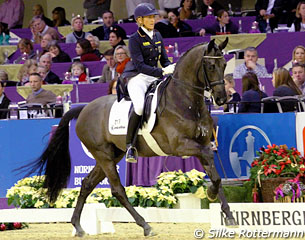 A most different horse from the talented, but solid looking Real Dancer was the next horse in the ring: Dresden Mann, an 8-year-old Westfalian gelding by Dresemann and ridden by Germany’s double Olympic eventing champion Ingrid Klimke. The clearly blood influenced, light bodied horse was a bit unlucky in his attempts to qualify for the final, finishing second several times during the qualifier season. However when Patrik Kittel lost the ride on Donna Unique, the English owned horse was given permission to step in. Klimke had successfully presented Dresden Mann at the Bundeschampionat and World Championships at Verden the years before, but "Alfi" turned out to be quite difficult at times when his hormones took over. Now gelded, but still stallion-like in expression and looks, the black stood his ground in Frankfurt. An equine showman like Burlington, Dresden Mann took in the atmosphere as soon as he entered the arena and obviously enjoyed presenting himself. After a good halt Klimke, who was the only rider wearing a helmet, risked something in the first trot extension. The horse is very quick on his feet and moves lightfooted in a way Rembrandt did 20 years ago, but he also tends to become a bit fast in front. Right before the transition to walk Dresden Mann spooked, but Klimke quietly passed the ominous corner and began an extended trot which could have shown more overtrack and a nose a bit more in front of the vertical. The walk pirouettes were both excellent and the best of the whole field, followed by a copybook canter-strike-off. The canter tour is very confirmed and the horse certainly knows the job. In particular the flying changes were a highlight with Dresden Mann changing the lead in complete balance, keeping the same rhythm throughout and never losing his clear uphill tendency. Although the horse seemed to become a bit edgy during the last extended canter, the Westfalian executed a very good last centreline and halted absolutely square and on the bit. It was a classy ride for sure, but the judges’ opinions differed. Whereas Peter Holler saw the gelding in 6th place and his colleague Dr. Evi Eisenhardt in 5th, Katrina Wüst placed him 2nd. In the end Klimke and Dresden Mann took a surprising 3rd.
A most different horse from the talented, but solid looking Real Dancer was the next horse in the ring: Dresden Mann, an 8-year-old Westfalian gelding by Dresemann and ridden by Germany’s double Olympic eventing champion Ingrid Klimke. The clearly blood influenced, light bodied horse was a bit unlucky in his attempts to qualify for the final, finishing second several times during the qualifier season. However when Patrik Kittel lost the ride on Donna Unique, the English owned horse was given permission to step in. Klimke had successfully presented Dresden Mann at the Bundeschampionat and World Championships at Verden the years before, but "Alfi" turned out to be quite difficult at times when his hormones took over. Now gelded, but still stallion-like in expression and looks, the black stood his ground in Frankfurt. An equine showman like Burlington, Dresden Mann took in the atmosphere as soon as he entered the arena and obviously enjoyed presenting himself. After a good halt Klimke, who was the only rider wearing a helmet, risked something in the first trot extension. The horse is very quick on his feet and moves lightfooted in a way Rembrandt did 20 years ago, but he also tends to become a bit fast in front. Right before the transition to walk Dresden Mann spooked, but Klimke quietly passed the ominous corner and began an extended trot which could have shown more overtrack and a nose a bit more in front of the vertical. The walk pirouettes were both excellent and the best of the whole field, followed by a copybook canter-strike-off. The canter tour is very confirmed and the horse certainly knows the job. In particular the flying changes were a highlight with Dresden Mann changing the lead in complete balance, keeping the same rhythm throughout and never losing his clear uphill tendency. Although the horse seemed to become a bit edgy during the last extended canter, the Westfalian executed a very good last centreline and halted absolutely square and on the bit. It was a classy ride for sure, but the judges’ opinions differed. Whereas Peter Holler saw the gelding in 6th place and his colleague Dr. Evi Eisenhardt in 5th, Katrina Wüst placed him 2nd. In the end Klimke and Dresden Mann took a surprising 3rd.
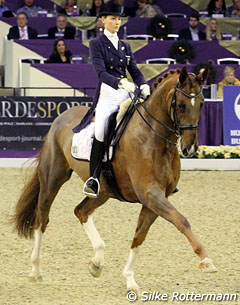 Kathleen Keller, daughter of dressage trainer Dolf-Dietram Keller and the 2012 Hamburg Dressage Derby winner, rode her better horse at the end of the class. Desperados is, like his more famous namesake, a Hanoverian by Danone I out of a Werther-dam and bred by Kathleen’s parents. The colourful liver-chestnut cannot deny his grand sire and was described by Kathleen as “a very dear and cuddly horse!” He lost some points by hesitating in the trot off after the first halt, but made up for it with his very good trot extensions. While the hind-legs are working in an exemplary way and really carried weight, Desperados has a fairly flat front-leg action which is rather unusual in today’s dressage world, but fortunately that fact not at all diminished the excellence of his extensions. In the good extended walk the gelding immediately stretched, though the overtrack itself was not too much. The first walk pirouette was diligent and in rhythm with the second less good. Desperados has an equally strong canter tour as well. The pirouettes were both quite settled, though the second slightly hasty. In the flying changes the well tempered horse was balanced and changed leads clearly in an even rhythm. The last trot extension might have been the very best of all, earning them two 9s. The final halt in itself was very correct, but lasted not long enough, prompting the judges either to award it a 6 or a 8 With 74.293% Kathleen Keller and her family pet could not repeat their second place of the warm-up class and finished in 5th position, but only 7 points behind the bronze.
Kathleen Keller, daughter of dressage trainer Dolf-Dietram Keller and the 2012 Hamburg Dressage Derby winner, rode her better horse at the end of the class. Desperados is, like his more famous namesake, a Hanoverian by Danone I out of a Werther-dam and bred by Kathleen’s parents. The colourful liver-chestnut cannot deny his grand sire and was described by Kathleen as “a very dear and cuddly horse!” He lost some points by hesitating in the trot off after the first halt, but made up for it with his very good trot extensions. While the hind-legs are working in an exemplary way and really carried weight, Desperados has a fairly flat front-leg action which is rather unusual in today’s dressage world, but fortunately that fact not at all diminished the excellence of his extensions. In the good extended walk the gelding immediately stretched, though the overtrack itself was not too much. The first walk pirouette was diligent and in rhythm with the second less good. Desperados has an equally strong canter tour as well. The pirouettes were both quite settled, though the second slightly hasty. In the flying changes the well tempered horse was balanced and changed leads clearly in an even rhythm. The last trot extension might have been the very best of all, earning them two 9s. The final halt in itself was very correct, but lasted not long enough, prompting the judges either to award it a 6 or a 8 With 74.293% Kathleen Keller and her family pet could not repeat their second place of the warm-up class and finished in 5th position, but only 7 points behind the bronze.
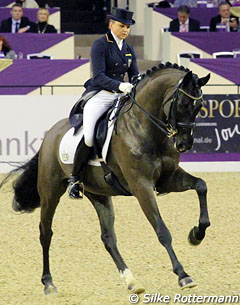 Like Keller, Olympic team silver medalist Dorothee Schneider had two horses in the class. After she had presented the Oldenburg stallion Fackeltanz earlier, Schneider rode St. Emilion at the end of the class. This Westfalian by Sandro Hit out of an Ehrenwort-dam had been the 2011 bronze medalist at the World Championships for 6-year-old dressage horses and has matured remarkably since then. The black stallion is a charming and very well trained horse. The whole trot tour was very consistent and accurately ridden, resulting in a majority of 8s on the running score board. St. Emilion continued at this level in the regular extended walk showing sufficient over track. In the walk pirouettes the judges were again disagreeing rather a lot, awarding marks between 5 and 8! The canter tour was less impressive than the trot one, but the Sandro Hit-offspring stayed almost faultless. A small hiccup at the last flying change after the extended canter cost them valuable points with marks between 2 and 7. With exactly 72% Dorothee Schneider finished in 8th place overall.
Like Keller, Olympic team silver medalist Dorothee Schneider had two horses in the class. After she had presented the Oldenburg stallion Fackeltanz earlier, Schneider rode St. Emilion at the end of the class. This Westfalian by Sandro Hit out of an Ehrenwort-dam had been the 2011 bronze medalist at the World Championships for 6-year-old dressage horses and has matured remarkably since then. The black stallion is a charming and very well trained horse. The whole trot tour was very consistent and accurately ridden, resulting in a majority of 8s on the running score board. St. Emilion continued at this level in the regular extended walk showing sufficient over track. In the walk pirouettes the judges were again disagreeing rather a lot, awarding marks between 5 and 8! The canter tour was less impressive than the trot one, but the Sandro Hit-offspring stayed almost faultless. A small hiccup at the last flying change after the extended canter cost them valuable points with marks between 2 and 7. With exactly 72% Dorothee Schneider finished in 8th place overall.
Frankfurt had seen a Burgpokal final with 12 out of 14 horses scoring over 70% and several of them showed great promise for a future at the highest of levels. Though there had been the odd ones, a few moved with tension, were behind the vertical and on a too strong bit contact, but the majority of the presented horses were delightful to watch because they were supple, submissive and obviously happy in their work. German team trainer Monica Theodorescu, who had looked at each horse, confirmed this impression: “It was a super final. There are many horses which can make a stand at Grand Prix-level later on and I hope they remain in Germany.” Theodorescu stressed in a comment published on St. Georg online that not only the quality of horses had been impressive, but also the fact they were presented in a fine way.
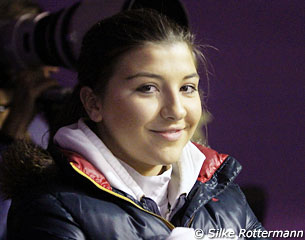 Whereas the final itself was a thrilling Saturday morning entertainment, the prize-giving that followed was totally disconcerting. At international level the rule says that the placed horses enter the arena one by one with only the first three horses lining up together for the ceremony. As the Burgpokal is a national class this rule was not practised. Was this the sponsors' or organiser’s wish? Although one should expect well trained horses to be able to stand still for a certain period of time while the prizes and ribbons are awarded, not all of the youngsters were enthusiastic of the darkened indoor and atmosphere. With 12 horses in the first half of the indoor arena meant taking a certain kind of risk, nothing happened there. Unfortunately it did come to an incident later on when the three first placed did their extra lap of honour. Burlington apparently got so excited from the clapping and the music that surprisingly he spooked in front of the exit and swung round, almost crashing into Ingrid Klimke’s Dresden Mann who cantered behind. To avoid a crash the gelding swung round as well. This incident could have easily ended in serious injury and though everybody escaped unscathed it should give food to think about for all. The same can be said about the fact that no rider, except Ingrid Klimke, wore a helmet during the prize-giving. One can moan easily about the fact that quite some dressage horses of our times seem to react much more sensitively to a prize-giving than their predecessors once did. One can discuss the reasons for sure, but when comparatively much more experienced Grand Prix horses (which are definitely better used to the razzmatazz of such a big show) are allowed in on their own, why do the youngsters have to come in all at once? The welfare of the horse and rider should always come first and it is time to think about how to make prize-givings more horse-friendly as much as it is time for the riders to think about how to better prepare their mounts for their moment of glory in the spotlights.
Whereas the final itself was a thrilling Saturday morning entertainment, the prize-giving that followed was totally disconcerting. At international level the rule says that the placed horses enter the arena one by one with only the first three horses lining up together for the ceremony. As the Burgpokal is a national class this rule was not practised. Was this the sponsors' or organiser’s wish? Although one should expect well trained horses to be able to stand still for a certain period of time while the prizes and ribbons are awarded, not all of the youngsters were enthusiastic of the darkened indoor and atmosphere. With 12 horses in the first half of the indoor arena meant taking a certain kind of risk, nothing happened there. Unfortunately it did come to an incident later on when the three first placed did their extra lap of honour. Burlington apparently got so excited from the clapping and the music that surprisingly he spooked in front of the exit and swung round, almost crashing into Ingrid Klimke’s Dresden Mann who cantered behind. To avoid a crash the gelding swung round as well. This incident could have easily ended in serious injury and though everybody escaped unscathed it should give food to think about for all. The same can be said about the fact that no rider, except Ingrid Klimke, wore a helmet during the prize-giving. One can moan easily about the fact that quite some dressage horses of our times seem to react much more sensitively to a prize-giving than their predecessors once did. One can discuss the reasons for sure, but when comparatively much more experienced Grand Prix horses (which are definitely better used to the razzmatazz of such a big show) are allowed in on their own, why do the youngsters have to come in all at once? The welfare of the horse and rider should always come first and it is time to think about how to make prize-givings more horse-friendly as much as it is time for the riders to think about how to better prepare their mounts for their moment of glory in the spotlights.
Text and Photos © Silke Rottermann for Eurodressage
Related Links
Scores: 2012 CDN Frankfurt
Schurmann and Burlington Secure Victory in 2012 Nurnberger Burgpokal Finals
Thomas Wagner and Very Keen Win 2012 Louisdor Cup Finals
Previous Winners
Desperado OLD Wins 2011 Nurnberger Burgpokal Finals
Meyer zu Strohen and Rassolini Win 2010 Nurnberger Burgpokal Finals in Frankfurt
Blind Date, 2009 Nurnberger Burgpokal Winner
Victoria Max-Theurer and Augustin Win the 2007 Nurnberg Burgpokal Finals
Comic Hilltop FRH Wins 2006 Nurnberg Burgpokal Finals
Ann Kathrin Linsenhoff and Wahajama Unicef win 2002 Nurnberger Burgpokal
Cockney, 1999 Nurnberger Burgpokal Winner